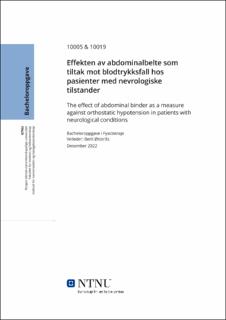| dc.contributor.advisor | Østerås, Berit | |
| dc.contributor.author | Normann, Sunniva Aslaksen | |
| dc.contributor.author | Nordbotten, Øystein | |
| dc.date.accessioned | 2023-02-03T18:19:24Z | |
| dc.date.available | 2023-02-03T18:19:24Z | |
| dc.date.issued | 2022 | |
| dc.identifier | no.ntnu:inspera:131381922:131386925 | |
| dc.identifier.uri | https://hdl.handle.net/11250/3048408 | |
| dc.description.abstract | Tittel: Effekten av abdominalbelte som tiltak mot blodtrykksfall hos pasienter med nevrologiske tilstander
Problemstilling: Hvilken effekt har abdominalbelte som tiltak for å motvirke blodtrykksfall ved mobilisering av pasienter med nevrologiske tilstander?
Metode: Studien er gjennomført som en litteraturgjennomgang av eksisterende forskning. Det er gjort systematiske søk i databasene PubMed, Cochrane Library og Web of Science. Helsebibliotekets sjekklister for randomiserte kontrollerte studier og kasus-kontroll studier er benyttet for å vurdere kvaliteten på studiene.
Resultat: De tre inkluderte studiene har vist at abdominalbelte kan ha en effekt på ortostatisk hypotensjon. To av studiene viste signifikant økning i BT ved bruk av abdominalbelte sammenlignet med placebo eller ingen tiltak, for henholdsvis Parkinson-pasienter og ryggmargsskadde (Fanciulli et al., 2016; Groot et al., 2019). Den tredje studien fant at abdominalbelte kan gi tidligere ortostatisk stabilitet sammenlignet med ingen belte, hos hjerneslagpasienter (Vijayakumar et al., 2012).
Konklusjon: Datamaterialet på området var mangelfullt, lite homogent og med lav metodisk kvalitet. Til tross for lite datamateriale med lav metodisk kvalitet, peker likevel de inkluderte studiene i retning av at abdominalbelte kan ha effekt mot ortostatisk hypotensjon ved mobilisering av pasienter med nevrologiske tilstander. Mer forsking er nødvendig for å trekke en konklusjon.
Nøkkelord: Abdominalbelte, blodtrykk, ortostatisk hypotensjon, mobilisering, nevrologi | |
| dc.description.abstract | Title: The effect of abdominal binder as a measure against orthostatic hypotension in patients with neurological conditions
Research question: What effect does an abdominal binder have as a measure against blood pressure drop in mobilization of patients with neurological conditions?
Method: This is a litterature review on existing research to answer the research question. Systematic searches have been done in the databases PubMed, Cochrane Library and Web of Science. To evaluate the quality of the studies, Helsebibliotekets checklists for randomized controlled trails and case-control studies.
Results: The three studies included have shown that abdominal binders may have an effect on orthostatic hypotension. Two of the studies showed that abdominal binders increased blood pressure compared to placebo or no treatment, in patients with Parkinson and spinal cord injury (Fanciulli et al., 2016; Groot et al., 2019). The last study showed that abdominal binders could result in earlier orthostatic stability compared to no belt, in patients with stroke (Vijayakumar et al., 2012).
Conclusion: The material found about this topic was deficient, not homogenous and with low quality. Despite the deficient material with low quality, the three included studies indicated that abdominal binders could have an effect as a preventive measure against orthostatic hypotension. More research is needed to prove the effect of abdominal binders.
Key words: Abdominal binder, abdominal belt, blood pressure, orthostatic hypotension, mobilization, neurology | |
| dc.language | nob | |
| dc.publisher | NTNU | |
| dc.title | Effekten av abdominalbelte som tiltak mot blodtrykksfall hos pasienter med nevrologiske tilstander | |
| dc.type | Bachelor thesis | |
